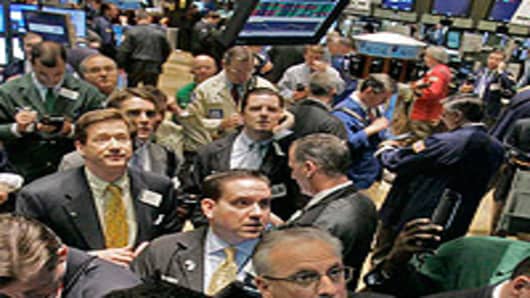As chaos reigns in Cairo, calm has fallen on Wall Street.
A one-day selloff in the stock market on Friday seems all but forgotten and investors appear ready to move on. That was especially true after President Hosni Mubarak announced late Tuesday that he would not seek re-election.
An expected spike in oil prices didn't materialize, though energy stocks are back at the forefront, leading the latest charge for the major indices.
So if the overthrow of governments in the oil-rich Middle East can't rattle investors, what will?
"What you need is something more dramatic that gets the market's attention," says Quincy Krosby, strategist at Prudential Financial in Newark, N.J. "What happens is the market moves on, and it has in every event. It moved on after 9/11. Unless there is a growing concern of contagion and the kind of contagion that affects the oil markets, the market will go on now."
That fear that the crisis in Egypt would spread through neighboring countries triggered a sharp selloff in the equities market on Friday, sending the averages down more than 1.5 percent and triggering concern that this would be the long-awaited catalyst to squelch the latest rally.
But even as the country's version of the Million Man Marchreflected how deeply the divisions run in Egypt, investors were focusing on other signs. So an expected run into safe-haven assets like the US dollar and Treasurys has not happened, and confidence consequently has risen that the revolt against authoritarian governments in the region would not spread and destabilize global capital markets.
"The markets have taken a wait-and-see stance," says Kim Rupert, managing director of global fixed income at Action Economics in San Francisco. "Obviously, stocks are still looking pretty solid with gains on the back of good data. (Investors are) optimistic that the Egypt situation isn't going to turn more radical."
Treasurys have taken a hit this week, particularly farther out on the yield curve where the Federal Reserve is not buying.
The spread between two-year and 10-yearnotes has reached a historic high exceeding four percentage points. The move both represents the turn toward risk trades and the Fed scooping up shorter-dated Treasurys at a blistering pace—accounting for 35 percent of the buys in last week's auctions of two-, five- and seven-year notes.
"Stocks and commodities are taking an optimistic outlook here, and I'm not sure it's really pollyannaish," Rupert says. "Unless something worse comes up, if the army doesn't let loose on the people and the whole region really erupts, then the markets can just go on their way."
The greatest market fear coming from the Egypt crisis was that crude oil prices would spike and drive global inflation. Oil did surge $4 in hectic Friday trading, but has settled in the first two trading days of this week and in fact was lower Tuesday. Brent crude prices have diverged from West Texas Intermediate, but analysts believe it is likely a temporary move.
At the same time, energy stocks have done well, but that could have as much to do with strong earnings from ExxonMobil as the citizen uprisings.
"The sector in the large-caps offers very attractive dividends, which has been the very theme for investors in the United States," Krosby says. "The confluence has been very attractive for investors, though that can change on a dime if the market perceives risk from the Egyptian crisis."
To be sure, investors are not completely unaware of risks, and retail investors continue to come back into the market only at a trickle.
Yet they continue to act as if US stocks are the most reliable vehicles now as global turmoil could change the landscape at a moment's notice.
"There are a tremendous number of issues down the road. Another $10 to $15 up in the price of oil is going to be an economic impacting event," Leon Cooperman, president and CEO at Omega Advisors, said in a CNBC interview.
"We have to worry what happened in Tunisia, now in Egypt—whether there are some more dominoes to fall here," he added. "These are all elements of uncertainty...Relative to various financial assets, I have a better shot of coming out in equities."
The confidence in US stocks comes amid not only geopolitical turmoil but also warnings of the inflation that drove much of the unrest and fears over what will happen once the Fed starts unwinding the positions it has taken in its $2 trillion-plus monetary easing program.
Nomura Securities, for instance, issued a critique Monday of Fed policiesasserting that the so-called quantitative easing policy was responsible for almost all of the rally off the late-August stock market lows, further warning that the rally is unsustainable and liable to retrace all those gains in the next two or three months.
For now, investors seem content that whatever future ills might befall the market, the Middle Eastern problems won't be a major catalyst.
Friday's selloff, after all, may have been as much bad timing as anything relative to the uprising, as traders don't like to hold long positions over a weekend when uncertainty looms. Consensus also has emerged that the crisis may not impact oil prices that greatly, with Julian Jessop, economist at Capital Economics in London, predicting Tuesday that brent crude prices will be back to $75 a barrel in 2012.
Egypt supplies very little oil to the US, which gets the bulk of its crude from Canada and Mexico.
"[I]t is not a foregone conclusion that popular revolts will spread further and more governments may topple," Jeff Kleintop, chief market strategist at LPL Financial in Boston wrote in an analysis. "Unless it inspires major uprisings in Saudi Arabia, Nigeria or other major oil producers, we expect the market and economic impact will be modest."



